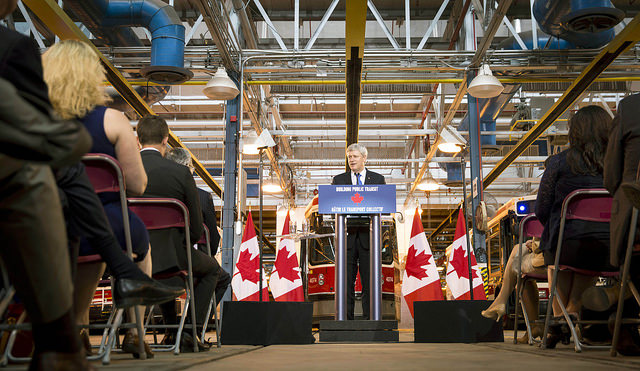The costs of climate change are piling up, and can no longer be ignored. The year 2015 is poised to be a landmark year, with a new global treaty on climate to be signed in Paris. In contrast, the Harper decade succeeded in stalling any meaningful climate action. The PM’s record is not just of neglect, but of moving the yardsticks backwards in both the international arena and within Canada.
Climate change is primarily caused by human use of fossil fuels (coal, oil and natural gas) for energy, whereas extraction and export of those fossil fuels is central to the Harper government’s economic strategy. With political roots in Alberta and the oil patch, it is no surprise that the Harper government champions the oil sands.
In its minority days, the Harper government felt obliged to at least pay lip service to climate change. In 2007, then Environment Minister John Baird released “Turning the Corner: An Action Plan to Reduce Greenhouse Gases and Air Pollution,” which promised “tough industrial regulations.”
No such regulations have yet to appear for oil and gas, the source of one-quarter of Canada’s industrial and commercial GHG emissions. At best, one can point to the transportation sector, where the Harper government has followed the lead of the Obama administration’s higher fuel efficiency standards for vehicles. Measures to address pollution from coal-fired electricity generation, on the other hand, carve out existing plants from any action until 2030.
If anything, climate policies have provided the PM a wellspring of rhetorical attacks. During the 2008 election campaign Harper took aim at Liberal leader Stephan Dion’s proposal for a carbon tax, calling it a “tax on everything” that would “screw everybody across the country.” With new attention on climate change in 2015, the PM recently returned to script, calling carbon pricing a “tax grab,” thus framing the preferred climate action instrument of many in small-government, anti-tax terms.
Within months of achieving a majority government, PM Harper pulled Canada out of the Kyoto Accord, a move that undermined the first global treaty aimed at constraining carbon emissions. More recently, in the lead-up to the Paris climate conference, Canada could not be bothered to meet a deadline for submitting greenhouse gas reduction targets.
One of the Harper government’s top foreign policy goals has been to seek approval of the Keystone XL pipeline through the United States. Amid popular resistance and delays from the Obama administration, the Harper government battled for new pipelines to the B.C. coast, to supply the Chinese market. Then natural resources minister Joe Oliver defined this as “an urgent matter of Canada’s national interest” in an open letter that smeared concerned citizens as radicals in the service of U.S. interests.
If anything, Oliver’s letter in early 2012 appears to have backfired, triggering widespread opposition in B.C. to pipelines and tankers, most notably Enbridge’s Northern Gateway project. The Harper government’s response has been to up the ante, approving the project, while using Canada Revenue Agency audits to intimidate critics in the environmental movement and beyond (my organization has also been singled out for audit).
Contrary views were also silenced. National Energy Board reviews of fossil fuel mega-projects no longer welcome public input, and in any event are not subject to scrutiny with regard to their climate impact. The National Roundtable on the Environment and the Economy, which had a habit of pointing out the credibility gap between government rhetoric and action, was shut down.
PM Harper’s record is thus one of relentlessly tearing down barriers to new fossil fuel development. This is perhaps best characterized by the 2012 omnibus bill, which among other things, dismantled environmental regulations that might affect oil sands growth, and accelerated approval processes for new pipeline and tanker projects.
In the courts, the Harper government has fought tooth and nail against the legal challenges posed by First Nations affected by oil sands development. However, fierce opposition from First Nations may be the undoing of Harper’s oil sands ambitions, as their rights are constitutional in nature and cannot be over-run by fiat.
More potent than pipeline protests, the collapse of oil prices starting in July 2014 dealt a critical blow to Harper’s economic plan. Saudi Arabia’s decision to no longer constrain production, and thus let world oil prices fall, has exposed Canada’s weakness as a high-cost producer.
Another looming shift will come from action on climate change, with an estimated four-fifths of Canada’s proven oil reserves needing to stay underground. The fossil fuel divestment movement is also having an impact, making fossil fuels into the new tobacco, and challenging a business model incompatible with a habitable planet.
Energy and climate have been central to the story of the Harper decade. In the end, history may render PM Harper’s central strategy of making Canada an “energy superpower” a failure.
Photo: pmwebphotos/flickr



